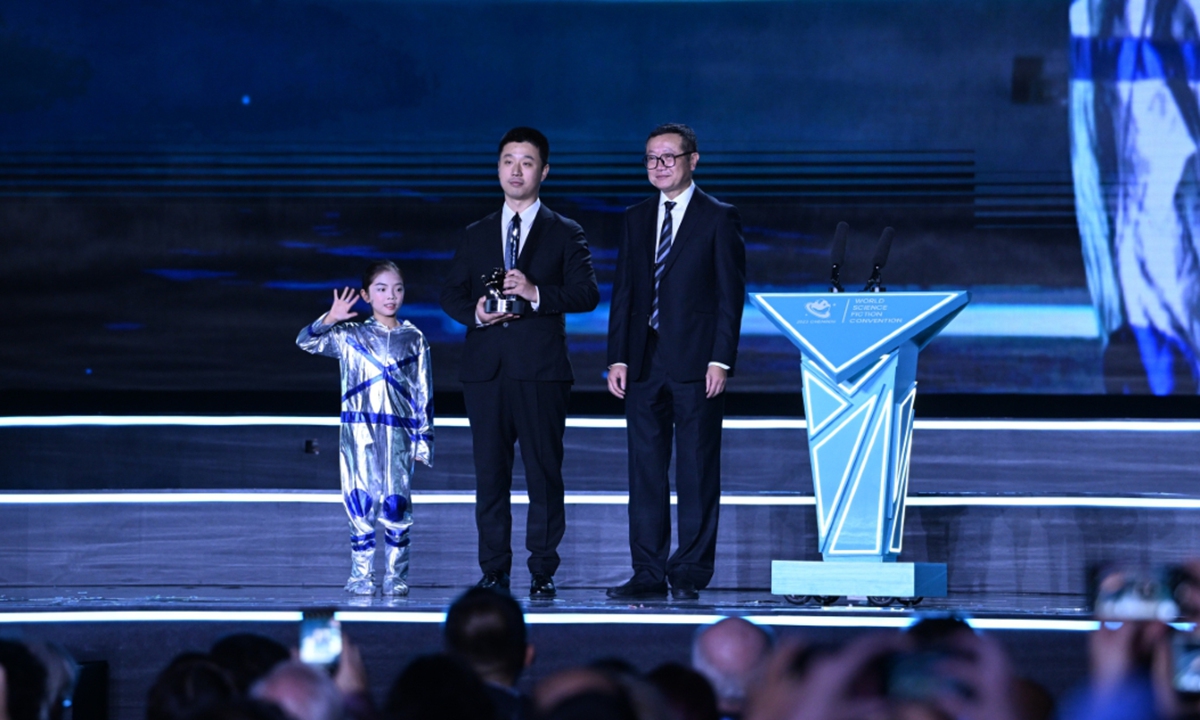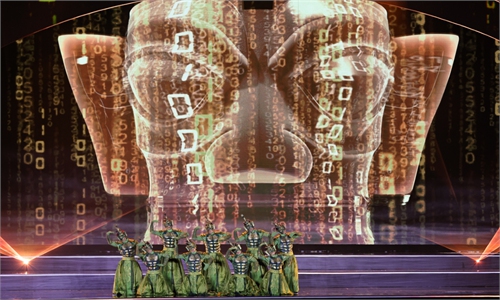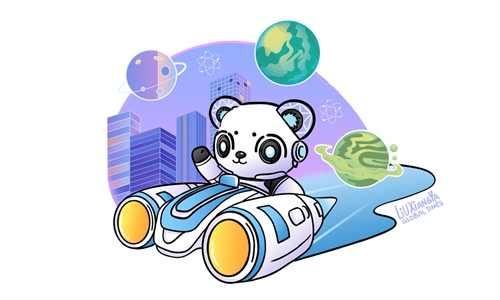ARTS / CULTURE & LEISURE
Chinese sci-fi authors underline challenges in developing domestic genre
Authors underline challenges in developing domestic genre

Hai Ya poses with his trophy beside Liu Cixin on October 21, 2023, in Chengdu, Sichuan Province. Photo: Courtesy of organizers
For 32-year-old Zhai Keyan, writing sci-fi stories has become an immersive experience of accessing the rich world of fiction as he continues to explore the sci-fi genre despite his intensive workload.Inspired by the works of Liu Cixin like the now globally famed The Three-Body Problem, Zhou, who works as a video producer, has published two novels online.
"When I started to read Liu's works, he was famous but not as renowned among the genre's fanbase as the present day when his works are globally celebrated," Zhai told the Global Times in Chengdu, capital of Southwest China's Sichuan Province, where the World Science Fiction Convention (WorldCon) was held from October 18 to 22.
Zhai recalled a book-signing event held in Chengdu back in 2010, with just over 300 people queuing for Liu's signature after the publication of Death's End, the third part of the Three-Body trilogy.
But at the recent WorldCon event, an estimated 3,000 people waited in line despite a limited two-and-a-half-hour timeframe to get Liu's signature. Some even traveled from as far as Shanghai and Lanzhou in Northwest China's Gansu Province, hoping to see Liu in person.
Liu's success has undoubtedly opened a new chapter in the development of Chinese sci-fi, but he is modest about the current potential of the domestic sci-fi genre.
"I don't think Chinese science fiction has entered a golden age. Although Chinese sci-fi is very popular now, it has gone from a very marginalized existence to a spotlight," Liu told reporters at a conference.
"China's overall sci-fi creation is still in the development stage as the number of genuine sci-fi readers and writers is still relatively small. To be exact, as sci-fi is still developing, it means that we have few influential writers and works."
Rising star
At the WorldCon, however, there were some promising signs, as the Chinese novelette The Space-Time Painter by Chinese author Hai Ya won the Hugo Award for Best Novelette. Hai is the third Chinese author to win the most prestigious international sci-fi award after Liu's Best Novel achievement in 2015 and Best Novelette won by Hao Jingfang in 2016.
The winning work tells the fictional story of the Northern Song Dynasty (960-1127) painter Wang Ximeng who died five years after he finished his only preserved masterpiece A Thousand Li of Rivers and Mountains.
Hai, who prefers to be identified by his pen name, now works in the financial industry in Shenzhen, South China's Guangdong Province and remains humble despite his surprise win.
"I think I'm more of a sci-fi fan than an author," Hai, who was born in 1990, told reporters after the win. "I wrote just to fulfill my passion, even though there is very little time for me to write every day. I think as long as I love this genre, I'm willing to 'pay for it,' and see the silver lining of it all."
He also noted the difference between sci-fi writers and scientific authors.
"I prefer the idea that a sci-fi author has a scientific spirit, passion and admiration for science, but it's not necessary that every single author's works can stand up to scientific scrutiny," Hai said.
"I think that there is no need to split hairs between our authors and readers, especially if the works are of good quality and inspire a love of science."
Jia Yu, three-time winner of the domestic Galaxy Award, also noted that most of today's sci-fi stories are based on space explorations as her works that focus on local geology explorations help her gain recognition.
"Sci-fi does not necessarily mean space explorations. There is still a lot 'to dig into' on our planet," Jia told the Global Times.

The Chengdu Science Fiction Museum, the main venue for the 81st World Science Fiction Convention Photo: Courtesy of organizers
Room for improvementWang Jinkang, an engineer who won a major domestic lifetime sci-fi award, believes that Chinese sci-fi novelettes have scaled new heights, but the genre still has room for improvement.
Echoing Wang's view, the position of the domestic Galaxy Award for Best Novel has remained vacant for two consecutive award periods.
"I think our novelettes have reached a world-leading level, but novels, except for the Three-Body trilogy and a few others, need to be improved," Wang told reporters.
"As for which specific aspect can be improved, I don't have a direct answer as sci-fi is a literary art not confined to one country, but also a borderless global literary genre based on science."
Renowned Canadian sci-fi author Robert Sawyer, winner of the prestigious Hugo and Nebula awards, said Chinese authors should focus on developing their own stories rather than imitating those of English-speaking countries.
"I always say to young Chinese writers, 'don't try to imitate or copy American or British and Canadian science fiction,'" Sawyer told a conference. "Invent your own Chinese science fiction, rooted in the culture of this land, the 5,000-year history of your people."
Grassroots writers like Zhai have also expressed that the long working hours have drained their daily creative energies.
"Some of my friends in the writing community have shared my idea that the long working hours have drained their energy to explore," Zhai told the Global Times. "I think it is also a problem for some fans as well, as they might find it hard to find the energy to continue to read after a long day."
But Jia holds the opposite view, saying that writing helps her deal with everyday concerns and pressures, especially when having a very busy schedule.
However, the authors all believe that China's development will undoubtedly boost the domestic sci-fi genre.
"Sci-fi and the country's economy as well as science and technology are closely related," Wang said.
"As long as China continues to enjoy rapid development, China's sci-fi literary genre is bound to have a brighter future."



